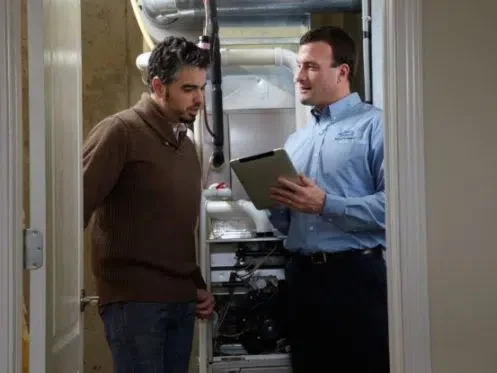You may be wondering if it is time to replace your heating system. The average expected lifetime of a furnace is about 15 to 20 years. However, the actual lifespan of a heating system can vary greatly depending on a number of factors. These include how well the system is maintained, how heavily the furnace is used, and the quality of the furnace you own.
Deciding to replace your furnace is easy if it stops working completely. However, the decision may be more complicated if your furnace is still working. As your furnace ages, it will not perform as well, will cost more to run, and may require frequent repairs. All these factors need consideration when deciding if it is time to upgrade your furnace. Learn why it may be time to replace your furnace and some benefits of a new heating system.
An Inefficient Furnace
The Department of Energy uses the Annual Fuel Utilization Efficiency (AFUE) to rate the percentage of heat a furnace produces for every dollar of fuel it consumes. Energy consumption costs are lower if the furnace’s AFUE rating is high. The ratings go up to 100%, and new systems have a rating of 90% or higher. If your current furnace is 15 years old or older, it most likely operates at 76% AFUE or lower. If you have been considering purchasing a new furnace but are hesitant because of the cost, realize that your new unit will begin reducing your energy costs when you first turn it on. The savings on heating bills will defray some installation costs over time.
Repair Costs
If you have started having to repair your furnace more often and each repair is getting more expensive, it may be time to consider a replacement. Because all the furnace’s components are the same age, when you need to replace one component, you may need to replace the other components as well. Before you decide that you would rather repair your furnace than replace it, add up how much it would cost to pay for these repairs. Experts generally recommend that if a repair bill is going to be half of what a new system would cost, it is time to consider an upgrade.
Unreliable Heating
Unfortunately, a breakdown often happens when the weather is severely cold because your furnace is working hard to maintain the temperature in your home. A breakdown during severe weather does not give you the time to shop around to get the best deal or research a heating system that will best serve your specific needs. In addition, an emergency breakdown does not give you the time to budget ahead to replace your furnace.
Poor Performance
You may have noticed that you keep turning up the thermostat during cold weather, but you still feel cold or that there are cold spots in your house. This could mean that your old furnace can no longer keep up with frigid temperatures because it is inefficient. One of the benefits of a new furnace is that it will heat your home evenly to the temperature you find most comfortable.
Safety Concerns
Just because your older furnace is still working does not mean it is safe. As furnaces age, the components can break down and cause a dangerous situation. The main component to be concerned about is the heat exchanger. The heat exchanger is the part of your furnace that heats the air. This component also helps keep the air in your home safe by making sure exhaust gases do not mix with the air that your family breathes. Over time, the heat exchanger can develop cracks from expansion and contraction that allow carbon monoxide to be released into your home. Carbon monoxide is odorless and colorless, so you may not even realize a problem exists. Inhaling this gas can cause headaches, nausea, and respiratory issues. It can also be deadly in extreme situations.
Benefits of Replacing an Old Furnace
Modern furnaces have a longer useful lifetime than ones manufactured in the past because of technological advances. This means that after installing a new furnace, you will have peace of mind knowing your heating system will last for years. In addition, by replacing your furnace, you can easily add zoning to increase the comfort level of your home and reduce energy bills by directing heat to where you need it.
Variable Speed Motors Reduce Wear and Tear
Newer furnaces use variable-speed motors that decrease wear and tear on the heating system, making them last longer and reducing repair costs. Older heating systems have a single-speed motor. When your thermostat calls for heat, an older furnace turns on full blast to meet the demand. This is like pushing the gas pedal in your car all the way down to accelerate to your desired traveling speed. It burns a lot of gas and is tough on the engine. Alternatively, the motor only runs as fast as needed to heat your house in variable-speed heating systems. The reduced load on the system over time means the furnace will have a longer lifespan and require fewer repairs because its components will not wear out as fast.
A New Furnace Will Give You the Option to Add Zones More Easily
If you live in a two-story home without zoning, you may have noticed that the upstairs tends to get overly hot in the winter while the downstairs remains uncomfortably cold. The solution to this comfort issue is to add two zones to your system, one for upstairs and one for downstairs. However, adding zones can be complicated and expensive if you have an older furnace. This is because, similar to the motor in an older system, the single-speed blower in an older furnace can only operate at full capacity. To make the zoning work, you would have to add a bypass duct to redirect excess hot air that would otherwise overheat a single zone. Alternatively, variable-speed systems can match the heating called for in a given zone. Many homeowners wait until they have replaced their furnaces to divide their homes into zones because it is cheaper and more manageable after the installation.
In addition to creating a more comfortable home, zoned systems can help homeowners reduce their heating bills. Heat can be directed to the main floor during the daytime and upstairs at night so that unoccupied areas of the home are not being heated when they do not have to be. If you divide your house into multiple zones, you can lower the temperature in seldom-used areas, such as storage spaces and guest rooms. According to the U.S. Department of Energy, HVAC zoning could reduce your heating costs by up to 30%.
Our Professional Services
At John Henry's Plumbing, Heating, Air, and Electrical, we have been serving the residents of Lincoln, NE since 1996. We install, maintain, and repair heating and cooling systems. In addition, we offer plumbing services, such as drain cleaning, sewer line repair, water filtration, and water softening systems. We are also sensitive to homeowners with emergencies outside of regular office hours. That’s why we offer 24/7 emergency services to our clients for issues like a burst pipe or a furnace that is not working during cold weather.
If you have been considering replacing your furnace, we can help you decide if it is necessary. We can also install your new heating system if you determine a new system is the best option. Contact John Henry's Plumbing, Heating, Air, and Electrical today to schedule an appointment.

